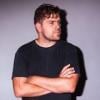
Can you trust the information you’ve just gotten? That’s a newly relevant question in our political environment, but it’s the basis of a lot of drama and theater. If composer Ted Hearne and his librettist Mark Doten had been interested, their music theater piece The Source, based on the Chelsea Manning – Wikileaks revelations would have made a great political thriller.
But the “oratorio and patchwork of songs” that emerged from Hearne’s creative process only toys at the edges of the thriller genre: “Who are you?” asks the man in contact with the leaker at the beginning of the piece. It’s an intro: The work, to be performed at the Taube Atrium Theater as part of San Francisco Opera’s OperaLab series (Feb. 24 – March 3), quickly adds layers that, to Hearne, are far more important.
Politics has been part of the composer’s profile since the highly-praised dramatic song-cycle Katrina Ballads (2007) made him well-known. Directly after Hearne began thinking about the Wikileaks documents released in 2010, the appearance of the leaker, Chelsea (then Bradley) Manning gave the piece more focus on the questions of identity and responsibility.
The Source assumes the audience knows Manning’s story and the music sets pieces of the documents released, as well as chat logs. The result is a show that probes the gray areas in the story from several angles.

“I identify with Chelsea Manning,” Hearne says, “and I identify with the struggle that she was verbal about going through, which is both a struggle of personal identity and a struggle of responsibility — and taking up identity in that way — and so the piece is more than about telling her story, more than taking a position on whistleblowing. It’s more about looking at the content of the leaks she exposed, asking ‘what would you do if you were in that situation?’”
Hearne sees this question – “what would you do?” — as a critical one.
“More than anything, [writing The Source] helped me deal with how I was so distant from the actions that were taking place,” he explained. “I felt – and I do feel – that I was in a completely different place from the servicemen and women whose experiences were depicted in those leaks, but also from the citizens of Iraq and Afghanistan. Right? I was living in Brooklyn with the privilege to be an artist. … And the nature of war now is that so many people in this country don’t have to think about it. At least, in my life, I didn’t really have to think about it. I was not made, economically or socially, to think about it.”

The work doesn’t have conventional theatrical action, and sometimes Hearne has described it as like a video installation. The musical score also refuses to conform to expectations, and Hearne has dispensed with operatic singing technique, which he finds too historically situated for his purposes. “The singers that I really love to listen and I find very expressive, most of them sing in a nonclassical style — R&B or some sort of pop or an early music style,” he says.
In some of Hearne’s other works, you find a kind of potpourri of musical reference over a base of minimalist-influenced groove (which makes sense, given that his teachers included Bang on a Can founders David Lang, Julia Wolfe, and Michael Gordon.) SFCV reviewer Giacomo Fiore, writing about the string orchestra piece Law of Mosaics described it this way: “The music emerges as an infectious network of quotations and allusions ... The musicians seamlessly conform to the rapidly changing styles of the sources, quoting inflections, timbre, and articulation in addition to themes and harmony …” If you’re a member of the millennial generation, your peers are listening to a wide range of music: “We live in a culture where you can easily put your iPod on grand shuffle; you can curate music for any particular situation.”
The Source uses this free play of styles to make the larger point about identity. Hearne explains:
The malleability of stylistic signifiers in the music started to become a metaphor for the fluidity of gender and the gray area between right and wrong – these questions don’t lend themselves to binary thinking; the definition of gender doesn’t lend itself to binary thinking and genre comes from the same root as gender. There’s lots of ways to play around those edges and those boundaries and I think it can help us think about how we contextualize things.
Hearne’s urbanity and receptivity to his musical environment has led him to a quintessentially urban genre: “There’s lot of indie rock musicians that I find very inspirational [but] my biggest [nonclassical] influences, especially on The Source hail from hip-hop. Because hip-hop is really an art of recombination. That strikes me as very contemporary.”

Hearne’s music pulls from all that, and can quote the Jerome Kern/Otto Harbach standard “Smoke Gets in Your Eyes” at the same time. Beyond all the technical features of the music, its DNA is the art of recombination: “Hip-hop producers have had their finger on the pulse of a new way of communicating with sound and I want to have my finger on that pulse, so that’s the music I look to for inspiration.”
The question of who you are, even as a musician, is a gray area itself, an answer produced provisionally, in context. Hearne’s generation of serious, independent musicians is not really caught between musical worlds so much as it has absorbed the influence of all of them, and imagines an audience that has done so, too. It’s a challenge to us traditionalists, of course, but then that’s what new art is meant to do.



